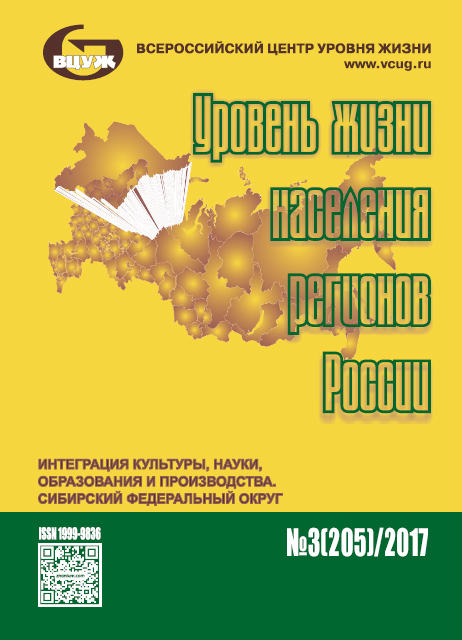Региональный материнский капитал: анализ региональных различий и влияния на репродуктивное поведение
Научная статья
Для цитирования
Гришина Е. Е., Цацура Е. А. Региональный материнский капитал: анализ региональных различий и влияния на репродуктивное поведение // Уровень жизни населения регионов России. 2017. Том 13. № 3. С. 51-58.
Аннотация
Объект: программы регионального материнского капитала Предмет: влияние регионального материнского капитала на репродуктивное поведение
Теоретическая сторона исследования. Статья посвящена анализу программ регионального материнского (семейного) капитала. Был проведен обзор законодательства субъектов РФ для выявления различий в условиях получения выплат регионального материнского капитала. Установлено, что программы регионального материнского капитала различаются по всем возможным параметрам: по очередности рождения ребенка, на которого предоставляется региональный материнский капитал, возможности повторных выплат, направлениям использования средств регионального материнского капитала, форме его предоставления (возмещение расходов по определенным направлениям или денежная выплата), периоду ожидания выплаты и срокам обращения за получением регионального материнского капитала, наличию ограничений на сроки использования капитала и сроки постоянного проживания на территории региона.
Эмпирическая сторона исследования. Пилотный опрос семей с детьми в Алтайском крае и Самарской области, проведенный в 2015 году, показал крайне низкую осведомленность семей о существовании регионального материнского капитала, размерах выплаты, условиях получения и направлениях использования средств, особенно среди семей с одним или двумя детьми. Поскольку население не знает о программе, нельзя говорить о том, что наличие программы может значимо повлиять на решение семей родить еще одного ребенка. В то же время, результаты исследования показывают, что на планы семей о рождении ребенка в ближайшие три года влияет уровень материального благосостояния семей и возраст матери. Цель: анализ влияния регионального материнского капитала на репродуктивное поведение
Ключевые слова:
регионы, региональный материнский капитал, социальная поддержка, семьи с детьми, репродуктивное поведение, региональное законодательство
Литература
1. Архангельский В.Н., Джанаева Н.Г. Региональные особенности динамики рождаемости и демографическая политика // Уровень жизни населения регионов России. 2014. № 1 (191). С. 73–82.
2. Biryukova S.S., A.O. Tyndik. Prevalence and determinants of childlessness in Russia and Moscow // Genus. 2015. 71(1). pp. 1-22.
3. Григорьев Ю.А., Баран О.И. Региональные меры поддержки семей с детьми и рождаемость в сибирском федеральном округе // Cовременные научные исследования и инновации. 2016. № 10(66).
4. Елизаров В.В. Экономическая поддержка семей с детьми в социально-демографической политике России: федеральные и региональные меры// VII Уральский демографический форум с международным участием: сборник статей. Т. 1: Социология и история воспроизводства населения России. Екатеринбург, 2016. С. 12-18.
5. Захаров С. Скромные демографические результаты пронаталистской политики в контексте долговременной эволюции рождаемости в России. Часть 2 // Демографическое обозрение. 2016. №4. С. 6–26.
6. Зверева Н.В. Действенность мер демографической политики в области рождаемости: оценки населения // Вестник Самарского государственного экономического университета. 2013. № 9 (107). С. 94-105.
7. Кадакоева Г.В. Совершенствование практики использования материнского капитала в региональной социально-экономической системе // Российское предпринимательство. 2014. № 24 (270). С. 125-137.
8. Калабихина И.Е. О региональном материнском (семейном) капитале // Вестник Московского университета. Серия 6: Экономика. 2013. № 2. С. 62-70.
9. Попова Л.А. Современная российская демографическая политика в области рождаемости: результаты и направления совершенствования // Экономические и социальные перемены: факты, тенденции, прогноз. 2016. № 2 (44).
10. Послание Президента Федеральному Собранию, 12 декабря 2012 года
11. Прокофьева Л.М., Рыбальченко С.И., Поддержка семьи, материнства и детства в регионах России // Народонаселение. 2013. № 4 (62). С. 018-028
12. Студенникова Н.С. Региональные особенности выплаты и использования материнского капитала // Вестник сельского развития и социальной политики. 2015. Т. 8. № 4 (8). С. 9-14.
13. Тындик А. Образовательный фактор репродуктивного поведения населения: Автореф. дисс. … канд. экон. наук. М., 2012.
14. Mörk, E., A. Sjörgen and H. Svaleryd, Cheaper Childcare, More Children, IZA Discussion Paper, 2009, No. 3942, Bonn
15. Rindfuss, R., D. Guilkey, Ph. Morgan and Ø Kravdal, Childcare Availability and Fertility, Population and Development Review, 2010
2. Biryukova S.S., A.O. Tyndik. Prevalence and determinants of childlessness in Russia and Moscow // Genus. 2015. 71(1). pp. 1-22.
3. Григорьев Ю.А., Баран О.И. Региональные меры поддержки семей с детьми и рождаемость в сибирском федеральном округе // Cовременные научные исследования и инновации. 2016. № 10(66).
4. Елизаров В.В. Экономическая поддержка семей с детьми в социально-демографической политике России: федеральные и региональные меры// VII Уральский демографический форум с международным участием: сборник статей. Т. 1: Социология и история воспроизводства населения России. Екатеринбург, 2016. С. 12-18.
5. Захаров С. Скромные демографические результаты пронаталистской политики в контексте долговременной эволюции рождаемости в России. Часть 2 // Демографическое обозрение. 2016. №4. С. 6–26.
6. Зверева Н.В. Действенность мер демографической политики в области рождаемости: оценки населения // Вестник Самарского государственного экономического университета. 2013. № 9 (107). С. 94-105.
7. Кадакоева Г.В. Совершенствование практики использования материнского капитала в региональной социально-экономической системе // Российское предпринимательство. 2014. № 24 (270). С. 125-137.
8. Калабихина И.Е. О региональном материнском (семейном) капитале // Вестник Московского университета. Серия 6: Экономика. 2013. № 2. С. 62-70.
9. Попова Л.А. Современная российская демографическая политика в области рождаемости: результаты и направления совершенствования // Экономические и социальные перемены: факты, тенденции, прогноз. 2016. № 2 (44).
10. Послание Президента Федеральному Собранию, 12 декабря 2012 года
11. Прокофьева Л.М., Рыбальченко С.И., Поддержка семьи, материнства и детства в регионах России // Народонаселение. 2013. № 4 (62). С. 018-028
12. Студенникова Н.С. Региональные особенности выплаты и использования материнского капитала // Вестник сельского развития и социальной политики. 2015. Т. 8. № 4 (8). С. 9-14.
13. Тындик А. Образовательный фактор репродуктивного поведения населения: Автореф. дисс. … канд. экон. наук. М., 2012.
14. Mörk, E., A. Sjörgen and H. Svaleryd, Cheaper Childcare, More Children, IZA Discussion Paper, 2009, No. 3942, Bonn
15. Rindfuss, R., D. Guilkey, Ph. Morgan and Ø Kravdal, Childcare Availability and Fertility, Population and Development Review, 2010
Форматы цитирования
Другие форматы цитирования:
APA
Гришина, Е. Е., & Цацура, Е. А. (2017). Региональный материнский капитал: анализ региональных различий и влияния на репродуктивное поведение. Уровень жизни населения регионов России, 13(3), 51-58. извлечено от https://www.jour.fnisc.ru/index.php/vcugjournal/article/view/8251
Раздел
УПРАВЛЕНИЕ УРОВНЕМ И КАЧЕСТВОМ ЖИЗНИ








